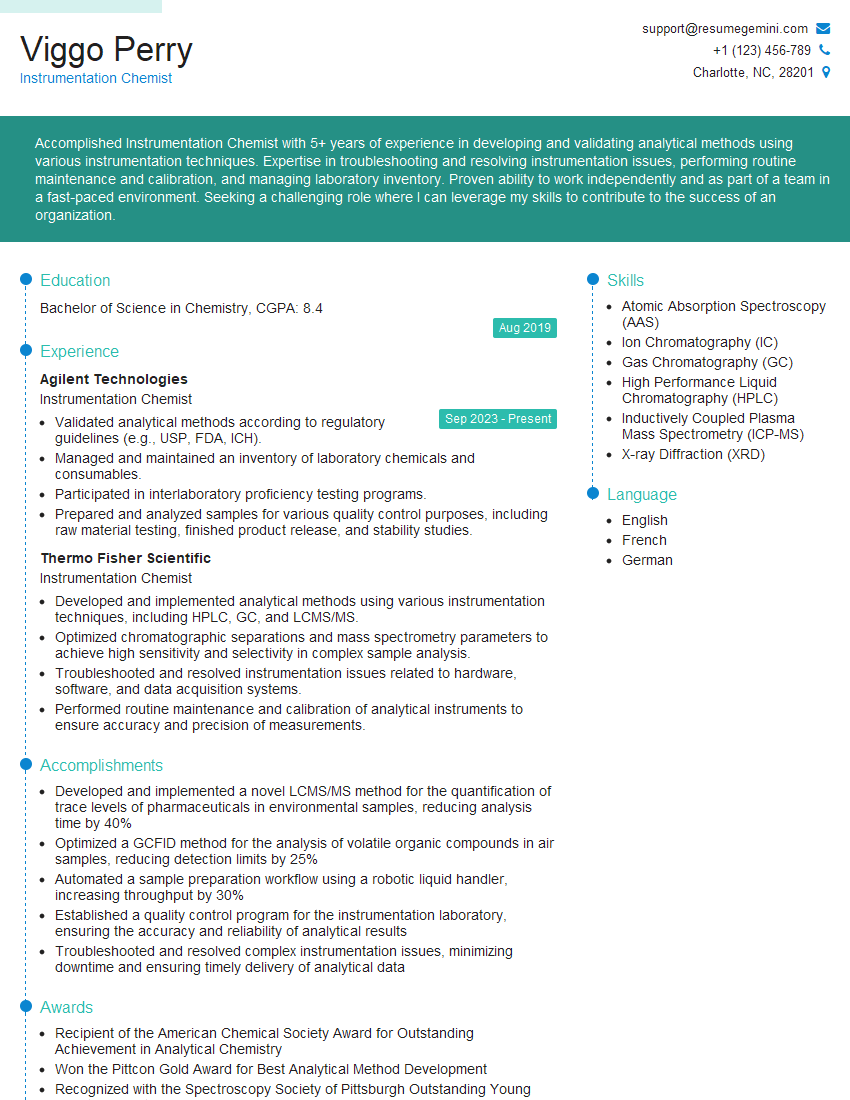Are you a seasoned Instrumentation Chemist seeking a new career path? Discover our professionally built Instrumentation Chemist Resume Template. This time-saving tool provides a solid foundation for your job search. Simply click “Edit Resume” to customize it with your unique experiences and achievements. Customize fonts and colors to match your personal style and increase your chances of landing your dream job. Explore more Resume Templates for additional options.

Viggo Perry
Instrumentation Chemist
Summary
Accomplished Instrumentation Chemist with 5+ years of experience in developing and validating analytical methods using various instrumentation techniques. Expertise in troubleshooting and resolving instrumentation issues, performing routine maintenance and calibration, and managing laboratory inventory. Proven ability to work independently and as part of a team in a fast-paced environment. Seeking a challenging role where I can leverage my skills to contribute to the success of an organization.
Education
Bachelor of Science in Chemistry
August 2019
Skills
- Atomic Absorption Spectroscopy (AAS)
- Ion Chromatography (IC)
- Gas Chromatography (GC)
- High Performance Liquid Chromatography (HPLC)
- Inductively Coupled Plasma Mass Spectrometry (ICP-MS)
- X-ray Diffraction (XRD)
Work Experience
Instrumentation Chemist
- Validated analytical methods according to regulatory guidelines (e.g., USP, FDA, ICH).
- Managed and maintained an inventory of laboratory chemicals and consumables.
- Participated in interlaboratory proficiency testing programs.
- Prepared and analyzed samples for various quality control purposes, including raw material testing, finished product release, and stability studies.
Instrumentation Chemist
- Developed and implemented analytical methods using various instrumentation techniques, including HPLC, GC, and LCMS/MS.
- Optimized chromatographic separations and mass spectrometry parameters to achieve high sensitivity and selectivity in complex sample analysis.
- Troubleshooted and resolved instrumentation issues related to hardware, software, and data acquisition systems.
- Performed routine maintenance and calibration of analytical instruments to ensure accuracy and precision of measurements.
Accomplishments
- Developed and implemented a novel LCMS/MS method for the quantification of trace levels of pharmaceuticals in environmental samples, reducing analysis time by 40%
- Optimized a GCFID method for the analysis of volatile organic compounds in air samples, reducing detection limits by 25%
- Automated a sample preparation workflow using a robotic liquid handler, increasing throughput by 30%
- Established a quality control program for the instrumentation laboratory, ensuring the accuracy and reliability of analytical results
- Troubleshooted and resolved complex instrumentation issues, minimizing downtime and ensuring timely delivery of analytical data
Awards
- Recipient of the American Chemical Society Award for Outstanding Achievement in Analytical Chemistry
- Won the Pittcon Gold Award for Best Analytical Method Development
- Recognized with the Spectroscopy Society of Pittsburgh Outstanding Young Spectroscopist Award
- Sigma Xi Research Excellence Award
Certificates
- American Chemical Society (ACS) Certified Analytical Chemist
- Instrument Society of America (ISA) Certified Instrumentation Technician
- National Institute for Certification in Engineering Technologies (NICET) Certified Instrumentation and Control Technician
- Society for Applied Spectroscopy (SAS) Certified Spectroscopy Technician
Career Expert Tips:
- Select the ideal resume template to showcase your professional experience effectively.
- Master the art of resume writing to highlight your unique qualifications and achievements.
- Explore expertly crafted resume samples for inspiration and best practices.
- Build your best resume for free this new year with ResumeGemini. Enjoy exclusive discounts on ATS optimized resume templates.
How To Write Resume For Instrumentation Chemist
- Highlight your skills and experience in the field of analytical chemistry.
- Showcase your expertise in various instrumentation techniques and their applications.
- Provide specific examples of your accomplishments and the impact of your work.
- Quantify your results and use data to demonstrate your effectiveness.
- Proofread your resume carefully for any errors before submitting it.
Essential Experience Highlights for a Strong Instrumentation Chemist Resume
- Developed and implemented analytical methods using HPLC, GC, LCMS/MS, AAS, IC, ICP-MS, and XRD.
- Optimized chromatographic separations and mass spectrometry parameters to achieve high sensitivity and selectivity in complex sample analysis.
- Troubleshooted and resolved instrumentation issues related to hardware, software, and data acquisition systems.
- Performed routine maintenance and calibration of analytical instruments to ensure accuracy and precision of measurements.
- Validated analytical methods according to regulatory guidelines (e.g., USP, FDA, ICH).
- Managed and maintained an inventory of laboratory chemicals and consumables.
- Participated in interlaboratory proficiency testing programs.
- Prepared and analyzed samples for various quality control purposes, including raw material testing, finished product release, and stability studies.
Frequently Asked Questions (FAQ’s) For Instrumentation Chemist
What is the role of an Instrumentation Chemist?
An Instrumentation Chemist is responsible for developing, validating, and implementing analytical methods using various instrumentation techniques to analyze and characterize materials and samples.
What are the key skills and qualifications required for an Instrumentation Chemist?
Key skills include proficiency in analytical chemistry, instrumentation techniques (e.g., HPLC, GC, LCMS/MS), data analysis, and troubleshooting. A Bachelor’s degree in Chemistry or a related field is typically required.
What are the typical job responsibilities of an Instrumentation Chemist?
Responsibilities may include developing and validating analytical methods, performing sample analysis, troubleshooting instrumentation issues, maintaining laboratory equipment, and ensuring compliance with regulatory guidelines.
What are the career prospects for an Instrumentation Chemist?
With experience and specialized skills, Instrumentation Chemists can advance to roles such as Senior Chemist, Laboratory Manager, or Research Scientist.
How can I enhance my skills as an Instrumentation Chemist?
Attend industry workshops, pursue professional certifications, stay updated on the latest advancements in instrumentation techniques, and network with other professionals in the field.
What are some of the challenges faced by Instrumentation Chemists?
Challenges may include working with complex samples, troubleshooting instrumentation issues, meeting regulatory requirements, and staying abreast of technological advancements.
What are some of the industries that employ Instrumentation Chemists?
Instrumentation Chemists are employed in various industries, including pharmaceuticals, food and beverage, environmental monitoring, and research and development.